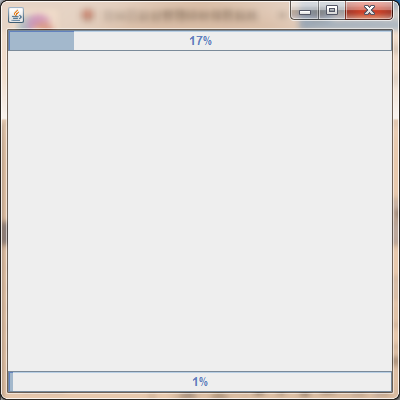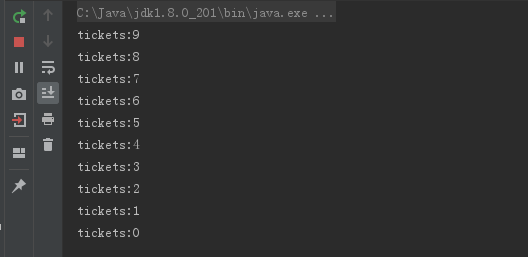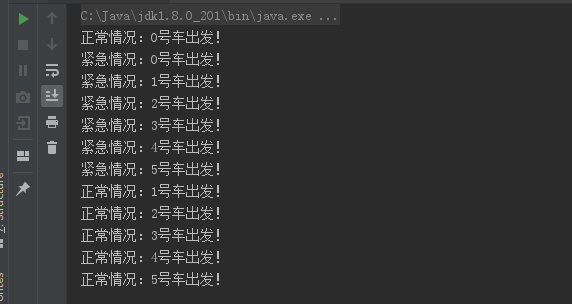JAVA进阶14
间歇性混吃等死,持续性踌躇满志系列-------------第14天
1、线程的加入

1 package code0328; 2 3 import javax.swing.*; 4 import java.awt.*; 5 6 public class JoinTest extends JFrame { 7 //定义两个线程 8 private Thread threadA; 9 private Thread threadB; 10 //定义两个进度条组件 11 final JProgressBar progressBar = new JProgressBar(); 12 final JProgressBar progressBar2 = new JProgressBar(); 13 int count = 0; 14 15 public static void main(String[] args) { 16 init(new JoinTest(), 400, 400); 17 } 18 19 public JoinTest() { 20 super(); 21 //将进度条设置在窗体最北面 22 getContentPane().add(progressBar, BorderLayout.NORTH); 23 //将进度条设置在窗体最南面 24 getContentPane().add(progressBar2, BorderLayout.SOUTH); 25 progressBar.setStringPainted(true); 26 progressBar2.setStringPainted(true); 27 //使用匿名内部类形式初始化Thread实例 28 threadA = new Thread(new Runnable() { 29 int count = 0; 30 31 //重写run方法 32 public void run() { 33 while (true) { 34 //设置进度条的当前值 35 progressBar.setValue(++count); 36 try { 37 //使A休眠0.1秒 38 threadA.sleep(100); 39 //使B调用join()方法 40 threadB.join(); 41 } catch (Exception e) { 42 e.printStackTrace(); 43 } 44 } 45 } 46 }); 47 //启动线程A 48 threadA.start(); 49 threadB = new Thread(new Runnable() { 50 public void run() { 51 //设置进度条的当前值 52 progressBar2.setValue(++count); 53 try { 54 //使B休眠0.1秒 55 threadB.sleep(100); 56 } catch (Exception e) { 57 e.printStackTrace(); 58 } 59 //当count变量增长为100时 60 61 } 62 }); 63 threadB.start(); 64 } 65 66 public static void init(JFrame frame, int width, int height) { 67 frame.setDefaultCloseOperation(JFrame.EXIT_ON_CLOSE); 68 frame.setSize(width, height); 69 frame.setVisible(true); 70 } 71 }
运行结果图

2、线程的安全

1 package code0328; 2 3 public class ThreadSafeTest implements Runnable { 4 //设置当前总票数 5 int num = 10; 6 public void run(){ 7 while (true){ 8 synchronized (""){ 9 if (num > 0) { 10 try { 11 Thread.sleep(100); 12 } catch (Exception e) { 13 e.printStackTrace(); 14 } 15 System.out.println("tickets:" + --num); 16 } 17 } 18 19 } 20 } 21 22 public static void main(String[] args) { 23 //实例化类对象 24 ThreadSafeTest t = new ThreadSafeTest(); 25 //以该类对象分别实例化4个线程 26 Thread TA=new Thread(t); 27 Thread TB=new Thread(t); 28 Thread TC=new Thread(t); 29 Thread TD=new Thread(t); 30 Thread TE=new Thread(t); 31 Thread TF=new Thread(t); 32 //分别启动线程 33 TA.start(); 34 TB.start(); 35 TC.start(); 36 TD.start(); 37 TE.start(); 38 TF.start(); 39 } 40 }
运行结果图

3、 线程的插队运行

1 package code0328; 2 3 class EmergencyThread implements Runnable { 4 public void run() { 5 for (int i = 0; i < 6; i++) { 6 try { 7 //当前线程休眠0.1秒实现动态更新 8 Thread.sleep(100); 9 } catch (InterruptedException e) { 10 e.printStackTrace(); 11 } 12 //紧急情况下车辆发车 13 System.out.println("紧急情况:" + i + "号车出发!"); 14 } 15 } 16 } 17 18 public class JoinThread { 19 public static void main(String[] args) { 20 //创建新线程 21 Thread thread = new Thread(new EmergencyThread()); 22 //运行新线程 23 thread.start(); 24 for (int i = 0; i < 6; i++) { 25 try { 26 //当前线程休眠0.1秒实现动态更新 27 Thread.sleep(100); 28 } catch (InterruptedException e) { 29 e.printStackTrace(); 30 } 31 //正常情况下车辆出发 32 System.out.println("正常情况:" + i + "号车出发!"); 33 try{ 34 //使用join()方法让新创建的线程优先完成 35 thread.join(); 36 }catch (InterruptedException e){ 37 e.printStackTrace(); 38 } 39 } 40 } 41 }
运行结果图

4、InetAdress类的常用方法


1 package code0328; 2 3 import java.net.InetAddress; 4 import java.net.UnknownHostException; 5 6 public class Adress { 7 public static void main(String[] args) { 8 //声明InetAddress对象 9 InetAddress ip; 10 //try预警捕捉可能出现的异常 11 try { 12 //实例化对象 13 ip = InetAddress.getLocalHost(); 14 //获取本地主机名 15 String Localname = ip.getHostName(); 16 //获取本地主机的IP地址 17 String localip = ip.getHostAddress(); 18 //输出本地主机名 19 System.out.println("本地主机名:" + Localname); 20 //输出本地主机的IP地址 21 System.out.println("本地ip地址:"+localip); 22 }catch (UnknownHostException e){ 23 //输出异常 24 e.printStackTrace(); 25 } 26 } 27 }
运行结果图

5、数组工具类Arrays


1 package cn.intcast.demo14; 2 3 import java.util.Arrays; 4 5 public class Code01Arrays { 6 public static void main(String[] args) { 7 int[] intArray = {1,2,3,4,5}; 8 //将int[]数组按照默认格式变成字符串 9 String inStr = Arrays.toString(intArray); 10 System.out.println(inStr); 11 12 int[] array1 = {11,23,4,2,1,10}; 13 Arrays.sort(array1); 14 System.out.println(Arrays.toString(array1)); 15 16 String[] array2 = {"o","z","d","s","a"}; 17 Arrays.sort(array2); 18 System.out.println(Arrays.toString(array2)); 19 } 20 21 }
运行结果图

6、字符串倒叙排列

1 package cn.intcast.demo14; 2 3 import java.util.Arrays; 4 5 public class Code01Arrays { 6 public static void main(String[] args) { 7 String intArray = "qweraszxc"; 8 char[] chars = intArray.toCharArray(); 9 Arrays.sort(chars); 10 for (int i = chars.length - 1; i >= 0; i--) { 11 System.out.print(chars[i]+","); 12 } 13 14 15 } 16 17 }
运行结果图







